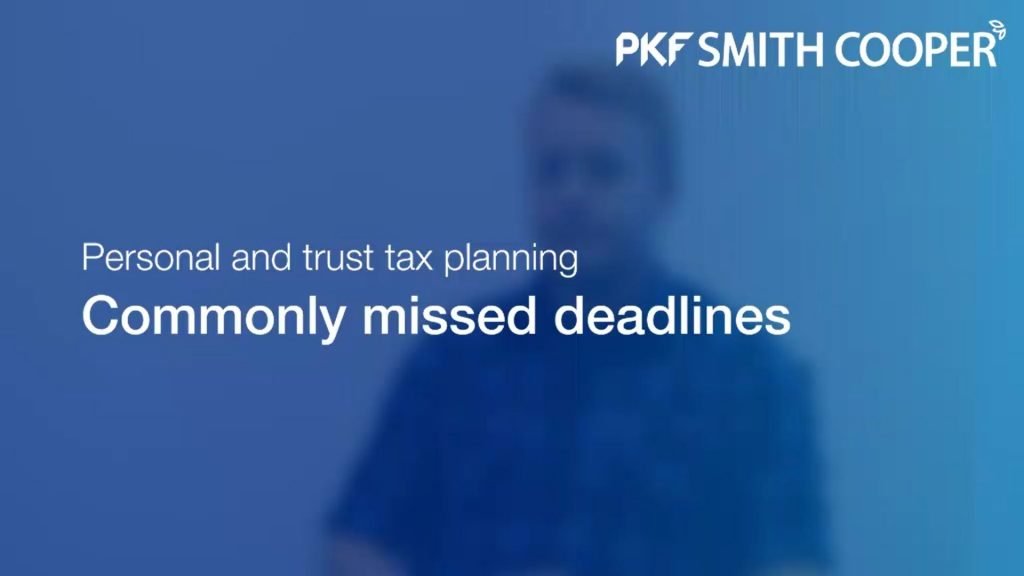When it comes to personal and trust tax planning, there are numerous deadlines that need to be met in relation to filing returns and making payments throughout the tax year.

Some of these deadlines take a considerable amount of time to prepare for, and failing to meet tax deadlines could result in penalties as well as interest being charged on late payments.
Below are some of the more unusual deadlines for individuals and trusts that often end up getting missed, that many individuals and trustees should be aware of.
IHT 10-year anniversary charge
Certain types of trusts may be liable to Inheritance Tax (IHT) charges every 10 years, depending on the value of assets within the trust.
Property trusts, discretionary trusts and interest in possession trusts may all be liable to this 10-year charge depending on their nature.
An IHT return needs to be submitted within 6 months of the 10-year anniversary charge occurring, and any IHT needs to be paid within the same period. Any capital distributions from a trust may also be liable to exit charges for IHT purposes.
Trust register update – 31st January
All trusts which are liable to tax in a certain year (such as Income Tax, Capital Gains Tax, Inheritance Tax or Stamp Duty Land Tax) will need to undertake a trust register update by the 31st January, which is the same as the Self Assessment tax return deadline.
The trust register needs to be updated regardless of whether there have been any changes to the trust in terms of the trust’s assets, the trustees, the settlor, or changes to any beneficiaries.
There are also forthcoming changes which mean that many existing trusts which are not liable to tax will also need to be registered with HMRC by 1 September 2022.
Second payments on account – 31st July
Payments on account are often required to pay your tax liability in advance depending on the level of your tax liability in order to spread the payments into 6-monthly instalments. The first instalment is paid on 31st January together with any balancing payment that is due from the previous year, with the second payment due on 31st July.
This deadline is also a good opportunity to consider whether your tax liability for the tax year just passed might be lower than the previous tax year.
If your tax liability is lower, you may be able to reduce the payment due on 31st July. However, if you reduce the payment to more than your liability turns out to be, there will be interest to pay on late payment.
Notify HMRC you need to complete a tax return – 5th October
If a tax return notice hasn’t already been issued to you, you will need to notify HMRC that you need to complete a tax return by 5th October.
If you don’t comply with this deadline and your tax return is submitted late, HMRC can issue penalties for failing to notify.
Collection of tax underpayments via PAYE tax code – 30th December
If you submit your tax return before 30th December after the end of the tax year and the tax payment sue is less than £3,000, you can ask HMRC to collect the tax via your pay as you earn PAYE tax code for the following year, rather than making a payment. This is also dependent on the level of PAYE income received being sufficient to enable HMRC to collect the tax liability through your tax code.
Elect for your pension scheme to pay annual allowance charges – 31st July
31st July (after the Self Assessment submission deadline) is also the deadline for electing your pension scheme to pay any allowance charges that you may have.
Individuals have a maximum amount of pensions savings each year that can benefit from tax relief –a pension annual allowance. If your total pension contributions exceed your annual allowance, you may be subject to an annual allowance charge.
Rather than paying the charge yourself, it is often possible to use a ‘Scheme Pays’ arrangement, where the charge is paid by your pension scheme rather than you personally.
If you are considering electing your pension scheme to pay your allowance charges, you should speak to an financial advisor with regards to the future impact on your pension scheme and your entitlements within the scheme, as electing for ‘Scheme Pays’ does affect future pension entitlements.
If you have any further queries regarding tax deadlines please get in touch with our specialist tax team who will be able to provide you with tailored advice.
Alternatively, you may also find our guide to commonly omitted tax return information useful, which highlights some of the frequently missed areas you need to be aware of when completing your Self Assessment tax return.
Watch our video below where Personal Tax Manager Daniel Stewart-Lacey explains more about commonly omitted tax return information. This video is part of our wider Inheritance Tax planning video series, which can be viewed on our YouTube channel.





